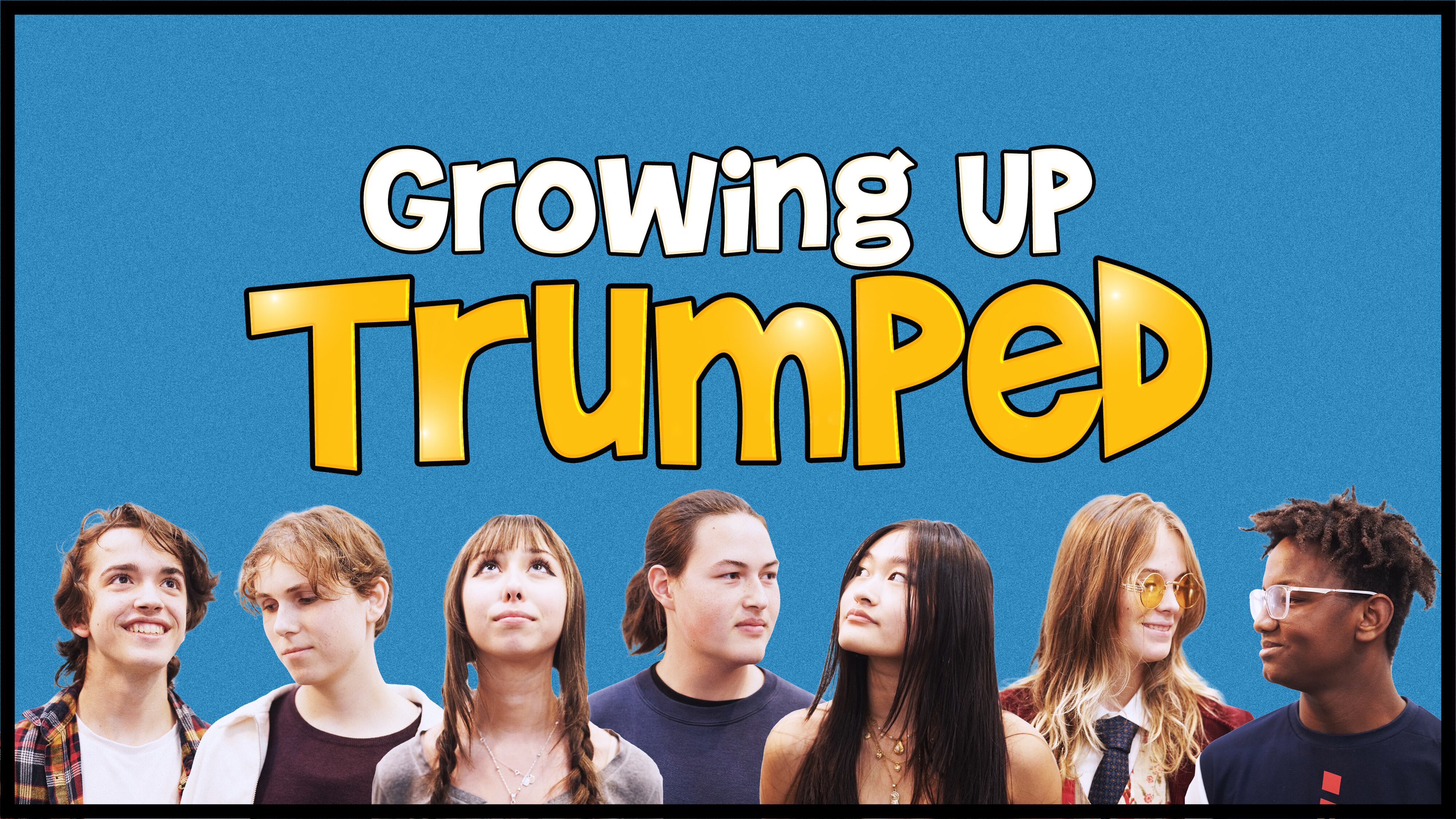On Nov. 6, the day after a national election that sent Donald Trump back to the White House, Elijah Graham and Owen King, who attend high schools on opposite sides of the Willamette River, were each greeted by the same Turkish proverb posted on their classroom bulletin boards: “When a clown moves into a palace, the clown does not become a king—the palace becomes a circus.”
A similar mood met students across Portland that Wednesday morning. “The air was pretty intense,” says Camila Sahagun, a sophomore at Lincoln High School. Connor Jacobsen, a senior at Benson Polytechnic High School, remembers seeing one of his teachers crying.
Yet none of the students was really surprised. After all, Trump has been president or stumping for a return to office since the four of them were in elementary school.
For these students, the MAGA movement is as basic a fact of life as doomscrolling on TikTok or streaming Sabrina Carpenter’s “Please Please Please.” We’ve long been told to look to the next generation for a way to move forward into a better future. But unlike Trump’s victory in 2016—or his refusal to accept his loss in 2020—an air of resignation has greeted this result, especially since early polling suggests Generation Z’s hostility to the MAGA movement is softening. Maybe…this is the future?
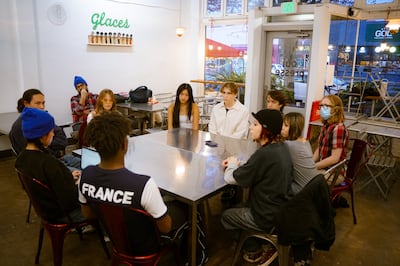
We figured we’d better ask. That’s why WW gathered nine Portland high school students last Thursday at Oui Presse on Southeast Hawthorne Boulevard for a roundtable discussion of how they feel about where the nation is heading.
The students hail from different backgrounds and attend different schools across Portland. But for an hour and a half, they came together to give us a glimpse into what high schoolers are thinking about, and how they’re feeling about the future of the country.
None of them felt that great: When we asked them to describe how they felt about the country in one word, “scared,” “dread” and “anxious” were popular answers.
All nine students said they preferred Vice President Kamala Harris to Trump, though only Jacobsen was old enough to vote in this election. (We tried to find a Trump-voting teen for the roundtable, but it proved difficult: The Oregon chapter of High School Republicans said it didn’t have a single member in Portland Public Schools.)
Perhaps Portland’s youth are in a bubble. (A Tufts University survey shows 46% of young voters cast their ballots for Trump. In 2020, that figure was 36%.) But they didn’t seem especially eager to engage in 2016-style protests, either. Jacobsen led one of the few student walkouts in Portland Public Schools to protest Trump but said Harris’ policies on Gaza had left him uninspired. A couple of students said their parents, fearing for their teens’ safety, wouldn’t allow them to attend protest marches.
We talked about more than politics. Like generations past, teens today are still worried about dating and what kind of jobs they’ll find after graduation. They also have big concerns that reflect the troubled times they live in.
In the end, we gathered that the kids—if a little scared—seem to be alright.
Answers have been lightly edited for brevity and clarity.
OUR PANEL
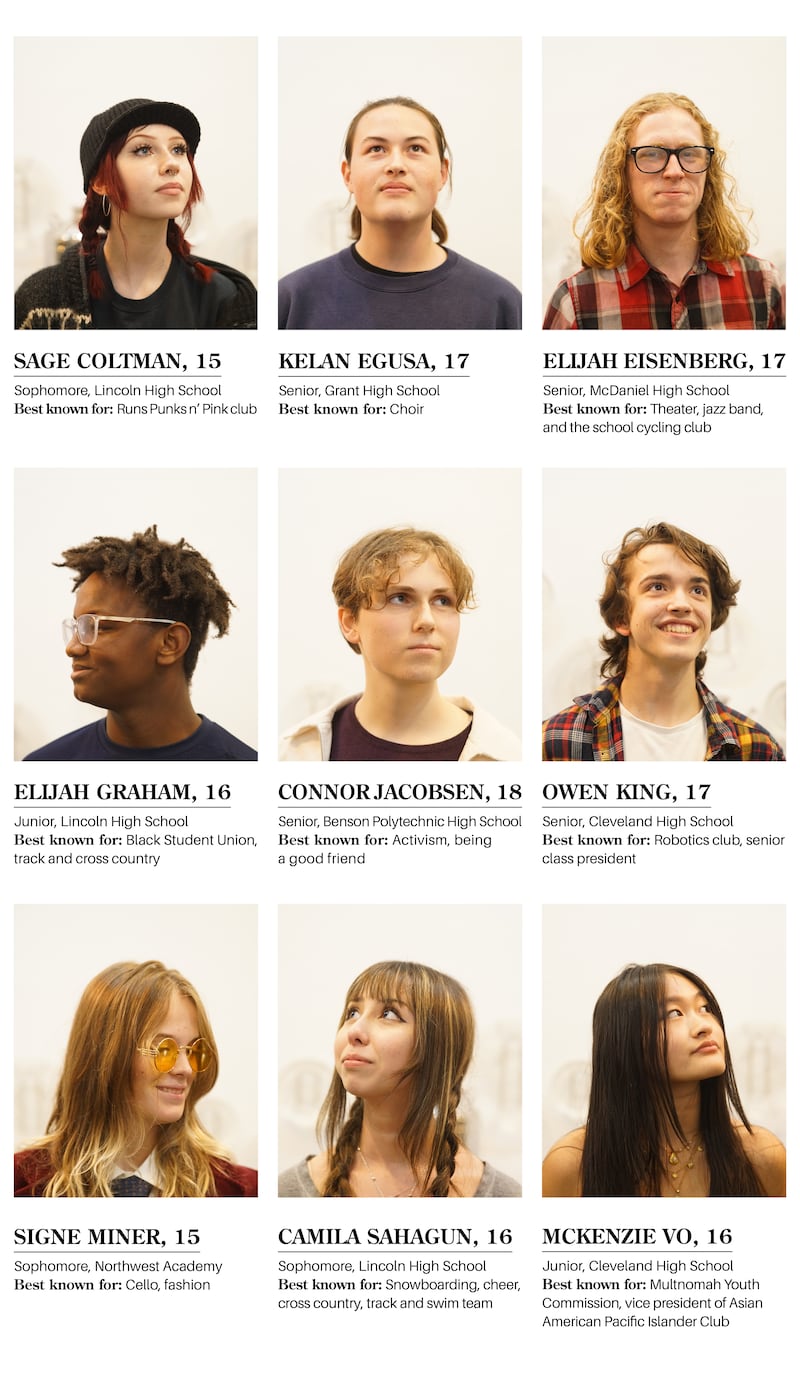
WW: In one word, how are you feeling about America?
Sage Coltman: Scared.
Kelan Egusa: Chaotic.
Elijah Eisenberg: Complex.
Elijah Graham: Worried.
Connor Jacobsen: Trapped.
Owen King: Dread.
Signe Miner: Anxious.
Camila Sahagun: Scared.
McKenzie Vo: Circus.
What was it like in your school the morning after the election?
Sahagun: I could tell people were very upset by it. Obviously, the people who were happy about the election brought it up sometimes in classes. Teachers stopped that conversation pretty quickly. But I could tell a lot of people, such as myself, were really upset.
King: As a senior, a lot of people I’m close to, this election is going to affect where they go to college. A lot of people that day even started looking at colleges outside of the country. I myself that Tuesday night, at probably 1 am, looked at University of British Columbia applications. My parents laughed at me, but I was being serious. It’s just worrying to know that someone who has that radical of ideas, and that I disagree with on those ideas, is leading the country and has the support of the other branches of government.
Jacobsen: Seeing all of the people that were really upset about it, especially all of my friends that are in the LGBTQ community and some of my teachers—some of my teachers were crying that day—that was really what sparked my wanting to organize a protest. I saw that everyone was really unhappy and I wanted to channel this energy in a more positive way.
Have you ever been to a protest?
[Five students raise their hands.]
Were you surprised by the lack of protests?
Miner: In the weeks leading up to the election, you started seeing the windows all boarded up. It’s tough because people are essentially anticipating violent protests. And then, in the time after [the election], we were all pretty surprised—we have an open campus, so we’re just walking around downtown, and I didn’t see much of anything.
Eisenberg: I’ve gone to a Youth Climate Strike protest. It’s really an energetic, exciting atmosphere for me. It’s really cool to see people like me out there in the streets and actually engaged and wanting to make a difference.
Vo: I have not had the opportunity to go to a protest. My parents are immigrants, and they have a fear of the government and of retaliation and fear if something dangerous were to happen at a protest. They tell me to focus on school and just not engage in any of that.
Sahagun: Same story here, my parents think that it’s safer for me to just stay in school and to work. There might be a lot of protests in general after Trump does take office, just because he does plan to do a lot of things on his first day of being president. That’s maybe when people will start protesting, because there are things getting put into action that people are clearly going to be upset about.
For many of you, Trump is the only GOP nominee for president you’ve ever known. How has that shaped your perception of the Republican Party and national politics?
Eisenberg: I’ve never known a world in which performative politics wasn’t the main thing. It seems like Trump’s whole shtick is riling up crowds by saying extreme things. It often feels like he’s more of an entertainer than a politician, and it seems like other people on both sides of the aisle are starting to copy that more.
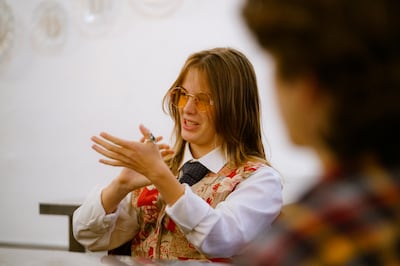
Miner: Adding on to what Elijah said, not to say that Donald Trump is worse than previous, more traditional Republicans, like Nixon, but his politics is more of a game. I feel like politics in general has become more of a game, especially with people constantly checking the polls and constantly making it seem like a sports event instead of a policy event. It’s almost a spectacle.
Sahagun: As a Mexican American, both of my parents are immigrants, so it impacts me a lot knowing that I could be at risk for something. It makes me really scared knowing what’s in the future and what it holds for a lot of immigrants.
Young men voted decisively for Donald Trump. There’s been a decent amount of discussion on the “bro vote” and its power this election. What do you make of all that?
King: This is something we’ve talked a lot about in the group that I’m a part of at school, the Healthy Masculinity Club. One of the main things we talk about is how social media tries to enforce on young men that self-improvement—such as going to the gym or working out and making money—are associated with more conservative ideas. A lot of the same people who are out posting for self-improvement on social media are also slowly altering your mind to, at the same time, see more conservative ideas in social media.
Egusa: From influencers that a lot of young men will look at, like Andrew Tate, there’s definitely a lot of misogyny there, and I think that bleeds into their life and their views. When Trump got shot, the picture of him holding his fist up…everyone’s just like, “Oh my gosh, he’s so awesome. Kamala would never.” This is stuff that young men see and think, this guy’s so awesome and tough and cool. I want this guy as my president.
Eisenberg: I usually scroll away from it, but it does seem like a lot of times, social media is trying to convince me to go to that side. Sometimes it’ll show me a far-right young white male podcaster, and it’s weird. I don’t hang out with anybody who’s like that in real life. But it sees that I’m a young, white male guy and puts that in my feed even if I am not interested.
How did you all feel about Kamala Harris’ campaign? Do you feel she did a good job appealing to young voters with her strategy? What could she have done better?
Graham: My mom being a Black woman, I feel like I could easily look up to Kamala Harris just because I look up to my mom as well. I feel like the way she targeted younger audiences wasn’t as good as it could have been. She did more of a TikTok influencer-type style towards it. Like Kamala HQ on TikTok wasn’t focused on her policies. It promoted her more and not her policies.
Sahagun: I think she did a good job trying to reach younger audiences. She did a lot of advertising with social media trends. I thought that was a smart, strategic move.
Jacobsen: I voted for her because she was way, way better than Donald Trump. But she had a lot of policies that I didn’t agree with, like her policy on Gaza and Palestine. She was wildly unpopular with probably anyone you ask who cares about that issue.
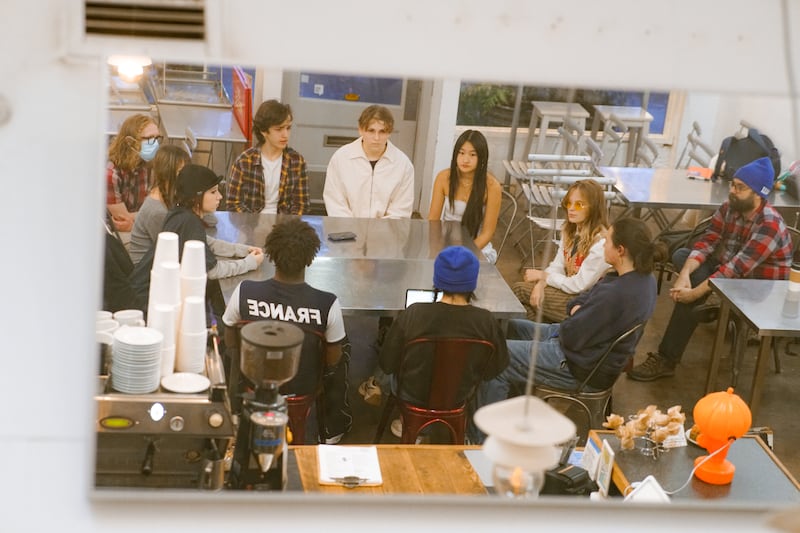
Did you follow local elections?
[Six students raise their hands.]
What are your takeaways from the local elections?
Eisenberg: I am really excited to see what Keith Wilson does. I think that he has a really interesting plan and seems like he really cares for the homeless community.
Miner: My school being downtown, I interact with homeless people a lot. Everyone was just like, “Please not Rene Gonzalez, please stop.”
Do you feel that your high school education is adequately preparing you for whatever you choose to do next?
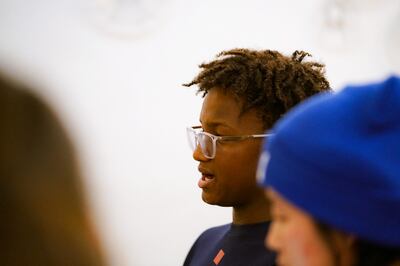
Graham: My math teacher told me that half the stuff that we learned in her class we’re never going to use outside the class. There are business classes, but I feel like they don’t do a great job of teaching financial literacy to everyone.
Jacobsen: I went to Benson because I was really interested in their career technical education classes, but a few years in, I realized that because they pour so much of their funding into those classes, they don’t have a choir program, and they don’t have a lot of elective programs that I really wish they had. I wish all of our schools had enough funding so that we could have students have career technical education but also have good electives.
Coltman: I feel lucky to be at Lincoln where there is a class that specifically goes into what I want to go into. I want to be somewhere in the design world. The class that pops into my mind is a career technical education class. I don’t think a lot of people would have the opportunity to take it.
Do you feel pressure to go to college, or has the world warmed up to technical education and other alternative pathways?
Vo: Both of my parents did not go to college, so they see college as the route to financial stability, which puts that pressure on me to also look at it as the only option. I’m at a point in junior year where I’m starting to notice the people who have parental guidance and support succeed more. I’m over here trying to figure out how I’m going to do certain things financially. And then I hear other people being like, “Oh, I’ve already taken the SAT.”
Jacobsen: That’s really interesting you would say that college is the route to financial stability. It’s complicated in my eyes because of how expensive it is now. You make more money if you go to college statistically, but also there’s a doubt in a lot of people that I talk to that they will be able to pay off their student loans.
In this moment, what are you the most stressed about?
Coltman: My grades and the climate.
Egusa: College.
Eisenberg: College applications.
Graham: Life.
Jacobsen: Climate change.
King: School.
Miner: The environment.
Sahagun: My grades and my future.
Vo: What I want to do with my life.
What’s something you wish your parents, or other trusted adults, would talk to you about?
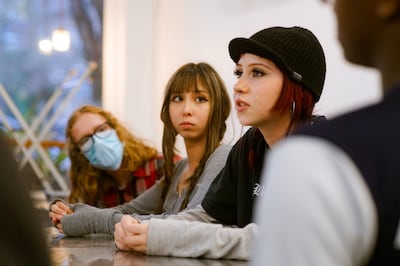
Coltman: Money. Now that I’m thinking about college, I’m worried about, what if we wouldn’t be able to afford it?
Miner: I’m neurodiverse, so I struggle with just managing very basic things. I feel like we need to have more conversations as I’m getting older about how I’m going to deal with that even when I’m away from them.
Eisenberg: I’d like my parents to talk to me about how I’m going to manage my finances in college on my own and how it’s going to work. They have a college fund for me, but I don’t know how that’s going to work and how they use that.
What’s something you feel like adults concentrate on too much when they think about high schoolers? What is something they don’t see?
Jacobsen: I think they focus too much on the fact that we’re all on our phones and not enough on why we’re all on our phones. I wish people would talk about how to fix that because it’s really sad.
Miner: Over half of people in Gen Z get their news from social media, from TikTok. There are a lot of issues with misinformation and no regulation on social media. But I think it’s also a good way to share information that’s not censored.
Sahagun: When I used to have TikTok, I would search up things on there more than I’d use Safari or Chrome, just because whenever I would get an answer from a video or something, I felt closer on a personal level with the person who was making the video. I would search up anything that way because I felt like it was easier for me to understand.
How’s the dating scene?
Eisenberg: It’s so weird trying to flirt with someone behind a screen. It feels so bland and dry to be texting people. I already struggled with social interaction a little bit as an autistic person, but it’s so much harder to gauge people’s emotions when I can’t see their faces.
Vo: There’s a big shift into more hookup culture now, and I feel like people are often not really looking for a long-lasting connection and more looking for someone to flirt with or just talk with.
Coltman: There’s a real disconnect between who you are online and who you are in person. For example, someone would reach out to me online and we would speak. Then I would meet them in person at school and I realize, “You’re really not the person that you make yourself out to be over Instagram or TikTok.”
King: I feel really lucky to have found someone who shares my disdain for mixed messages and confusing conversations and signals that are attempting to be sent over text. People just don’t say what they feel nowadays because there’s this sort of expectation that you talk in a text language that no one really fully knows.
How do you stay hopeful?
Eisenberg: I look at a lot of the local action that’s happening in Portland and my neighborhood, and it seems like there is a lot of really great stuff that’s happening right now. With the local elections, I was really happy how those went. And just following the local advocacy groups has helped me see that there are people who want to get that grassroots action out there.
Coltman: I spend a lot of time connecting with my friends because focusing on the big picture tends to stress me out a lot. So I just focus on what I have right now, my family and friends.
Vo: I stay hopeful by self-reflecting and staying away from the news.
Miner: I usually look at small things that I can personally work to improve. Like individual people I can help. For example, I’m in this club at school that works with the Schnitzer CARE Foundation, like fundraising to give grants to organizations. That’s a fun thing that really gives me a lot of hope because I’m actually contributing to something.
Graham: I like to either run, play basketball or take a nap. Because normally, by the time I’m done, I forget what I was worrying about. I realize, in the moment, there’s not much I can do and I can just hope for the best.
Where do you get your news?
Sage Coltman: Social media and word of mouth.
Kelan Egusa: Social media.
Elijah Eisenberg: Advocacy organizations and the Google homepage.
Elijah Graham: RapTV.
Connor Jacobsen: The Daily Show.
Owen King: Ground News.
Signe Miner: Newspapers. I like The Guardian and The New Yorker.
Camila Sahagun: Social media.
McKenzie Vo: AP News, The New York Times and social media.
What do you read, if anything?
Sage Coltman: I haven’t found a lot of time to read outside of class.
Kelan Egusa: I read what my classes assign sometimes.
Elijah Eisenberg: I’m reading Cixin Liu’s The Three-Body Problem right now, and some plays, like The Thanksgiving Play by Larissa FastHorse.
Elijah Graham: I just started reading Agatha Christie’s Death on the Nile, and we finished reading a play in English class. I’m pretty good at reading lyrics.
Connor Jacobsen: I just read a book about how to see people and connect with people more deeply.
Owen King: I read a lot of fantasy. Brandon Sanderson, specifically, and whatever books are assigned in class sometimes.
Signe Miner: An illustrated version of Das Kapital by Karl Marx.
Camila Sahagun: I just finished my English book, Ray Bradbury’s Fahrenheit 451.
McKenzie Vo: Banned books, right now The Handmaid’s Tale by Margaret Atwood.
Pull out your phone and share your screen time today.
Sage Coltman: One hour and 44 minutes.
Kelan Egusa: Usually five and a half hours a day.
Elijah Eisenberg: Five hours and four minutes.
Elijah Graham: Nine hours and 50 minutes.
Connor Jacobsen: Two hours and 49 minutes.
Owen King: Two hours and 46 minutes.
Signe Miner: One minute.
Camila Sahagun: Four hours and two minutes.
McKenzie Vo: Six hours.
